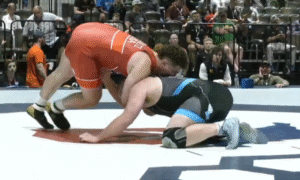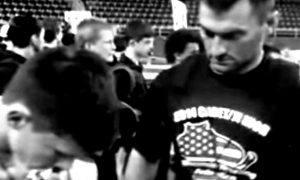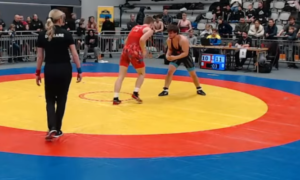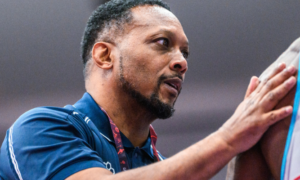On Saturday, six US Greco-Roman Seniors came away with medals at the 2018 Lavrikov Memorial in St. Petersburg, Russia. The tournament itself, while important for the stated objective of “getting matches in”, is not on the same level as top-tier events like the Hungarian Grand Prix or the Takhti Cup. But it does serve as a great way for the American athletes to immerse themselves in the Russian experience and grab some mat time ahead of training camp(s) and the pair of upcoming tournaments that will follow in consecutive weeks.
Two of the medalists from Saturday, Josef Rau (87 kg, Chicago RTC), who snared gold, and reigning US National champ Daniel Miller (97 kg, Marines), who pounded his way to bronze, offered additional insights after the tournament in effort to inject some more detail into what are, for all intents and purposes, incomplete results.
Rau
Rau earned his first foreign gold medal in over three years Saturday with that win in the finals arriving via forfeit. Of course — as noted above — Rau’s placement actually comes secondary to the overall goal of traveling abroad in search of competition. Friday, the first day of action, Rau faced three opponents and steamrolled to three tech fall wins. So it isn’t as if he got robbed out of competing.
What the win signifies more than anything for Rau is that he is beginning to get back to where he was last spring. He started off 2018 with a bronze in New York and came in second to two-time Olympian Ben Provisor (NYAC/NLWC) at the US Open. But before he could challenge for another crack at Provisor in the World Team Trials, Rau’s jaw was reportedly cracked by former teammate Malcolm Allen (130 kg, LOG) the week of the tournament. The ramifications were far-reaching: Rau not only missed the Trials, but he also had his jaw wired shut and was forced off the mat for nearly two months.
Then everything began to unfold in short order. First, Rau joined on at the Chicago RTC with multi-time World Teamer Robby Smith (130 kg). As soon as he was somewhat settled, Rau next took off for Germany, participated in that Grand Prix, hung around in Europe for a few more weeks, and jumped in the Pytlasinski Cup. He later capped off this rush of activity by shooting over to Colorado Springs to provide a body at Senior World Team Camp towards the end of September.
Rau’s tour will continue at next weekend’s Haparanda Cup in Haparanda, Sweden. In the meantime, he offered his perspective on what the Lavrikov tournament offered him personally — and why this experience was a net positive for his US stablemates, as well.
“This was a really fun tournament, this was a really good tournament. Not a lot of pressure. Just coming out here to get matches and have fun, and I did that. It went my way. It wasn’t the toughest tournament in the world but it felt good to get back onto the winning side of things. It has been really rough for me with the injuries, the multiple knee surgeries, all this stuff. It feels like I am constantly on the comeback and getting knocked back down. But it feels good to win a tournament and trying to build some momentum.
“Going into the Haparanda, I feel pretty good. It kind of stinks that the guy didn’t wrestle me in the finals. He said he hurt his back, but I don’t know. The team on the other side was pretty tough so I would have liked to wrestle that guy. But it happens, I guess. I can’t complain.
“I’m looking forward to putting in a little camp here and then getting over to Sweden for the Haparanda and some really tough competition over there. After that, I will hopefully get into the Haavisto (Cup) and get another really good tournament there. I’m not sure if I will be able to compete in that one yet, but for me, this is exactly what I need. I just want to compete. I love competing and I want to get on a roll because I know what I can be, but I need to build some momentum. I need to stay healthy.
“This was a really fun, great experience for me. I didn’t expect to love Russia so much (laughs). I love the people, I love wrestling here. It’s a cool experience. It’s like wrestling in Iowa, everybody loves wrestling or at least has a respect for it. It’s just really neat. It was a good tournament for me, and I’m looking forward to some tougher tournaments coming up so I can keep this thing going.
“I’d like to say that I think it’s cool to see guys like Ben Durbin (97 kg) here, the guy from Iowa State. You know, he doesn’t have a lot of Greco experience. He kind of has a cool story. He played football at Iowa State all through college, and then he came back and decided to wrestle Greco. I’m trying to help him and some of the other guys with stuff I’ve picked up over the years — and especially stuff I picked up from when I was a 98-kilo guy. I’m trying to help everybody out here in any way I can, just offer them advice or anything from a technical aspect. Just to share my experiences and maybe it will help some people. That has been something as I get to be an older guy that I find rewarding, to try to help other athletes.
“Mike Donato (77 kg), Delon Kanari (63 kg), and some of the other Northern guys had a couple of matches where one little mistake and they lost. Unfortunately for Kanari, he only had one match. But you know, that’s what this is all about. It stinks to come all the way out here and pay to come to another country and then lose your only match. I told him how I had just paid to go on a big tour a couple of months ago and then I lost every match. That’s just the way it goes with these things. Sometimes you’ll have a good tournament, sometimes you’ll have a bad tournament, but it doesn’t really matter. What matters is what you take away from it. Are you learning things? Are you figuring things out as far as strategy goes and as far as technique goes? Putting together match plans, how to prepare — all that stuff is important to gain from these tours.
“I was trying to tell Kanari that everyone has these tournaments where they come and then go 0-1. (Andy) Bisek told me himself that he is like 0-8 or 0-9 at some tournament in Russia (laughs). Every time he came to it, he lost. But you’ve just got to keep coming. Bisek has two (World) bronze medals but there is a tournament somewhere where he has never won a match.
“This was a good tournament and a good developmental tournament for this time of the year to work on your skills. We had a lot of Northern Michigan guys, a lot of Marines. The Marines keep impressing me. They are traveling everywhere, getting in matches, getting medals. It seemed like it was the Marines versus Russia in this tournament (laughs). We had Patrick Smith (77 kg, Minnesota Storm), Durbin from Iowa State, the Marines, and me from the Chicago RTC. I think we had a good showing. Guys had a lot of really tough matches.
“There were some bad calls that cost guys some matches but I think that’s a good experience in itself. Pat had a match in the repechage where the ref screwed him and there was only a minute left and he still found a way to win. I think whether you win or lose in that scenario after getting screwed that you have to look at that as a good experience. Maybe if you didn’t capitalize or maybe you didn’t pull out the win, or even if you did, you dealt with that adversity and now next time you know what you have to do. Pat has had trouble in the past with coming back when he was down. He got a bad call (today) when he was down and should have been winning with short time, but he found a way to win and that was a really good match for him, especially right now.”
Miller
He isn’t just the captain of the All-Marine Team — he is also an actual Captain in the US Marine Corps as well as one of the fastest-rising Greco athletes in the country. Miller’s presence on this tour (of which he will be one of a dozen wrestlers to participate in all three events) brings with it a different element of expectation this time around. The former Naval Academy competitor began his Greco career by demonstrating a natural ability to rough it up against foreigners, yet he struggled domestically. Miller now has five relevant overseas medals to his credit, but it was only last year when he won the US Open for the first time — an anomaly for this generation.
But after winning that National title and putting together a pair of impressive bouts opposite 2016 Junior World bronze/two-time Senior World Team member G’Angelo Hancock (Sunkist) back in June, Miller is no longer going to sneak up on anyone. He knows this. And because of that fact, he’s once again back at work in pursuit of dreams that well exceed his goals on the domestic circuit.
It is also part of the reason why his insights are so valuable for the audience.
Miller is keenly able to communicate exactly what his approach is and how he views each and every match. In addition, he is equally well-versed at pointing out his in-match strategy and how he views overseas training excursions like this one.
“As far as this trip, it’s different this year. Last year, we were out here for a training camp prior to competing, which gave us time to acclimate to the time zone and to the athletes we were going to be competing with. This year, we got out here late, the night before the day of weigh-ins. When we arrived, we found a sports club, played a game of basketball, got a workout in, cut some weight, and then we came out later that afternoon. It was still the day before weigh-ins for this competition and we dropped off the rest of that weight.
“It’s kind of ironic for me. I must have read the scale wrong in the morning. I thought I was about a half a kilo over when I left — and then when I came back, I was about a kilo and a half over. So then I had to cut a kilo and a half in an hour, which was interesting because it has been a while since I’ve done that (laughs).
“I got it off, got down to weight. I think all of the guys did a really good job getting all of their weight off. It was a little quicker than we anticipated. I know some of us anticipated weigh-ins being on Friday and the tournament on Saturday/Sunday. But it was good, it was good. We got our weight down and you have to be able to adapt to that adversity whenever you go to these competitions. It’s good practice, good simulation.
“We came in and worked out with each other on the first day. We got our weights down and went straight into competition.
“My first match was frustrating for me. I felt like I got a good warm-up in, got a good blow in with Trent Osnes, our heavyweight. Overall, I think I wrestled a decent match. I was just driving too hard in the very beginning, trying to put that pressure onto my opponent, and he took advantage by getting an arm spin for four. Then they put me down because he was kind of dominating with a two-on-one in the first period.
“And then after the first period I talked to Major Jay Antonelli. One of my teammates was there, as well. They said, Look, you’ve got to get behind his elbow; you’ve got to move him, push him, and you’ll find opportunities to score. So that’s what I did in the second period. I got behind his elbow, I was moving him, and I was dominating the tie-up. I felt really good about it. The guy was smoked, he was absolutely smoked. But I couldn’t find the opportunities to score. His muscle memory was too good, his position was too good, and I shouldn’t have given up the four-point move that I did. Then I got on top and didn’t capitalize. I should have capitalized on my opportunity from top, as well. I got a lift, I lifted him up, and I couldn’t finish it. Multiple mistakes, things to touch up on and tighten up moving forward. And that’s what we’re here for. We are here in Russia for things to work on and things to improve moving forward.
“Like I’ve told you many times before, we train through these events and that’s what this was, a practice event. I went out there, lost my first match. I had opportunities to win, I created opportunities to win — which is the most important part — but I didn’t take advantage of those opportunities. So I lost that first match.
“Luckily, he made it through to the finals and I was pulled back into the repechage. The first match in the repechage was last night and I wrestled an individual from Belarus, the same individual who tech’ed me last year at this tournament in my very first match. I went 0-1 here last year.
“I came out, I knew what he was going to do. He arm-threw me twice last year. I felt like I countered it, I felt like I had the bad call. But regardless, it doesn’t matter what the call is, as we’ve talked about many times before. You have to put up a certain amount of points to win the match.
“This time, I went out firing, hit him with an arm throw, and scored four points. I was getting beat in the tie-up. He was pressuring me, and though I stopped him, before moving out of bounds I decided, Hey, let me try a headlock, because I thought I was in decent position. I was in terrible position for a headlock, I came to find out. But I threw the headlock so hard, he was forced to defend the headlock so hard, that I went around to the opposite direction and caught him on his back. Because I committed so hard to that move, it allowed me the opportunity to counter his counter. They gave me two for the counter to the counter, and then I came back on top and wound up pinning for the win. That was my only repechage match, and that was last night.”
“That was two matches yesterday, which put me in the bronze-medal match. I came back and wrestled the bronze-medal match today. I went against an individual who I never wrestled before from Russia. I came out, it was a tough pummel. They put me down in the first period so he’s up 1-0. He locked up a trap-arm gut, gets one gut, and then I defended from there. So I’m down 3-0. We continue that way, I’m working the pummel, trying to work. Pressure, pressure, pressure, change pressure, just trying to tire him out in the first period. He seems to be tired.
“After the first period, I go back (to the corner) and talk to Major Antonelli. As I am getting toweled down they’re telling me to keep applying the pressure and to get back to the front headlock, which I was now able to score on. So I get back out there and it’s Pressure, pressure, change. I wind up getting to a position where I am behind my opponent, who goes down to all four’s. I kind of finish with a high-leg between both of his legs for four. So now I’m up 4-3 and I continue to put pressure on my opponent, because at the end of the day, regardless of your opponent you need to be able to wrestle the same style at all times in order to win matches.
“So I continue to put pressure on my opponent — and he continues to get tired — so I snapped him down into a front headlock. He comes up so hard, I hit a duck on him and end up behind him again. It’s funny, because I ended up in a lift position and I probably should have finished with a four again. But I didn’t. Instead, I stepped between his legs because that’s where I was in the previous move, and wound up finishing for two. This is after I got to a front headlock in the very beginning of the second period and pushed him out for one. That put me at one for the step-out, four for the finish, and then two for the takedown there. That put me at seven points total.
“No other calls were made the rest of the match. I continued to pummel my way out, I changed directions, and moved into what I thought were advantageous tie-ups for me. So I ended up winning 7-3. I thought it was a good match. I liked what I did in that match. However, I also felt like there were opportunities that I missed. That’s why we talk about these training opportunities. Russia overall is a training opportunity and I am thankful to have it. As Marines, we train through these events and we have certain big events throughout the year for which we try to peak. We’re trying to train through this event and we have two more practices to go — another practice coming up next weekend in Sweden, and then the week after that in Finland. It will be a good practice to make weight, a good practice to compete, and there will be a lot of good opponents available.”
CLICK HERE TO DONATE TO THE USA GRECO-ROMAN PROGRAM
SUBSCRIBE TO THE FIVE POINT MOVE PODCAST
iTunes | Stitcher | Spreaker | Google Play Music | RSS



















